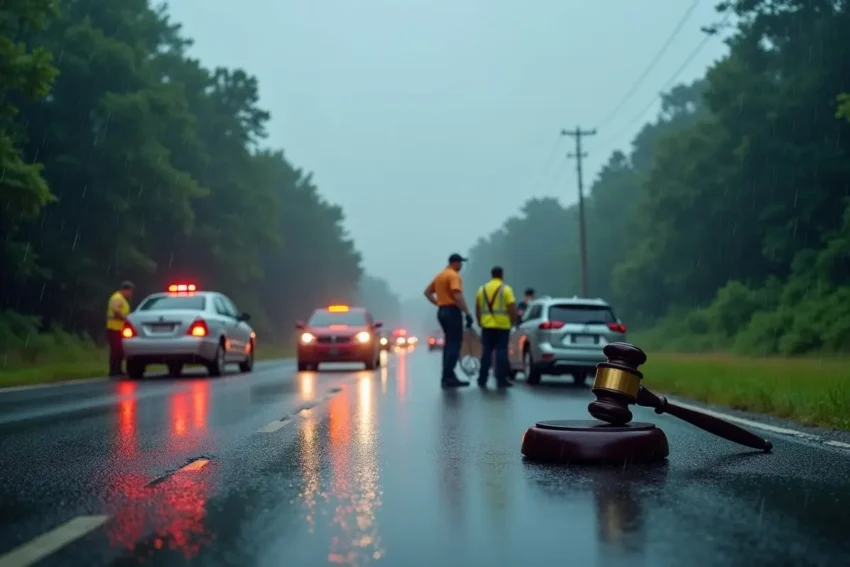Severe weather conditions, such as ice and heavy rain, often complicate liability in accident cases. Taylor King Law Firm in Arkansas understands how these factors interact with negligence laws to determine fault and compensation. This article examines why the weather plays a significant role in accident litigation within the state.
Navigating Negligence Laws in Weather-Related Crashes
Understanding Negligence in the Context of Weather
In Arkansas, determining negligence in weather-related accidents requires a nuanced approach. Unlike clear-cut cases of driver fault, adverse weather introduces variables that complicate the legal landscape. The state’s courts consider whether drivers exercised reasonable care given the circumstances. This involves assessing whether a driver adjusted their speed, maintained a safe distance, and used necessary safety measures in response to adverse weather conditions, such as heavy rain or icy roads. Reasonable care, a key component of negligence, is therefore contextual, adapting to the severity and type of weather encountered.
The Role of Comparative Negligence
Arkansas follows a comparative negligence system, which can significantly impact cases involving weather-related crashes. Under this rule, an injured party can still recover damages even if they are partially at fault, provided their share of the blame does not exceed that of the other party. Weather conditions often serve as mitigating factors, potentially reducing a driver’s percentage of fault. In practical terms, this means that if a jury finds a driver 30% responsible for a crash due to failing to account for slick roads, they could still recover 70% of their damages.
Challenges in Proving Fault
Proving fault in weather-related accidents often demands expert testimony and a thorough examination of environmental conditions. Lawyers might enlist meteorologists or accident reconstruction specialists to provide insights into the conditions at the time of the incident. This evidence is crucial to establishing the extent to which weather contributed to the crash and whether the drivers acted appropriately. Such complexity underscores the importance of experienced legal representation to navigate Arkansas’s intricate negligence laws effectively. By leveraging expert insights, attorneys can craft compelling arguments that account for all influencing factors, ensuring a fair assessment of liability.
Why Weather Plays a Major Role in Arkansas Accident Litigation
The Influence of Arkansas’s Unique Climate
Arkansas’s geographical position exposes it to a dynamic range of weather conditions, from torrential downpours to sudden freezes. This variability has a significant impact on road safety, leading to weather-related vehicular incidents that complicate legal proceedings and increase the risk of accidents. The state’s roads are often treacherous during seasonal transitions, when ice can form unexpectedly or heavy rain can obscure visibility, creating hydroplaning hazards. These conditions are not mere inconveniences but critical factors that can influence the outcome of accident litigation. Legal professionals must consider weather impacts when establishing fault, as these natural elements may mitigate a driver’s liability.
Negligence and Weather-Related Challenges
In Arkansas, the doctrine of negligence plays a pivotal role in determining liability in accident cases. Under this legal framework, a driver must exercise reasonable care to prevent harm to others. However, what constitutes reasonable care can vary significantly under adverse weather conditions. For instance, a speed that is safe on a clear day might be deemed reckless during a storm. Attorneys must adeptly argue how specific weather conditions influenced a driver’s ability to control their vehicle and respond to threats on the road. This often requires expert testimony and detailed analyses of weather reports, which can add complexity to the litigation process.
Legal Precedents and Case Studies
Historically, Arkansas courts have examined numerous weather-related cases, each contributing to a nuanced legal landscape. These precedents illustrate the complex ways in which weather can impact liability. For example, a case might demonstrate how a sudden ice storm led to a multi-car pileup, challenging the notion of a single liable party. Attorneys must be astute, leveraging these precedents to bolster their arguments, ensuring that justice is served while accounting for the unpredictability of nature. This underscores the importance of specialized legal expertise in navigating the intersection of weather and law in Arkansas.
Final Thoughts
In navigating the intricate landscape of weather-related crashes in Arkansas, you encounter a legal realm where nature’s unpredictability intersects with human accountability. Taylor King Law Firm in Arkansas understands that the unique challenges posed by severe weather are crucial for effectively addressing liability and securing just compensation. By recognizing the nuances of negligence laws and their interplay with environmental factors, you can better advocate for clients or comprehend your own rights following such incidents.

